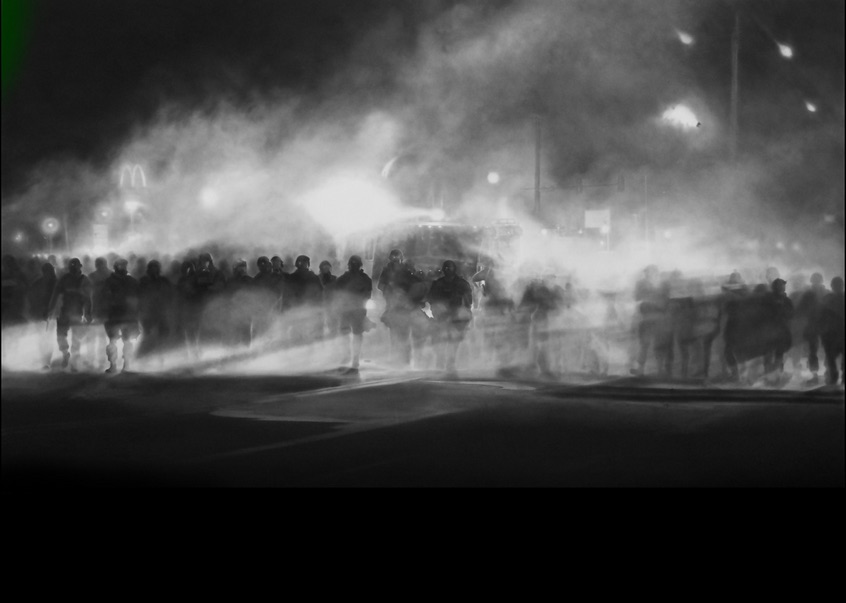[contextly_auto_sidebar id=”eKrMLYo8fgW54S2szszBIS4Q3AkfCC0z”]
The Ferguson UK Solidarity Tour met in London on Friday night to discuss deaths in police custody and the relationship between law enforcement agencies and the black community on both sides of the Atlantic. The tour, which is being led by Patrisse Cullors, co-founder of the #BlackLivesMatter campaign, has taken in meetings across the country, including at the Houses of Parliament.
On Friday, the Police Action Lawyers Group hosted the event at Doughty Street Chambers. Deborah Coles, the director of INQUEST, spoke first about her organisation’s work in ensuring that the voices of bereaved families are heard during investigations into deaths in custody. Setting the context of the meeting, she said that deaths in custody are ‘part of a continuum of violence and oppressive treatment’ and the broader issue of attacks on civil liberties by the government.
Deborah Coles reminded the meeting that, since 1990, despite 14 unlawful killing verdicts being recorded at police and prison inquests, there have still been no successful prosecutions arising from such deaths at either an individual or corporate level. The ‘narrative of the undeserving victim’ seeps into our culture to create a climate of impunity around deaths in custody.
Leslie Thomas QC, a barrister who has represented the families of Christopher Alder, Sean Rigg, Azelle Rodney, Mark Duggan and many others, spoke from his experience about common features occurring in a number of deaths at the hands of the state. These features include the failure by the authorities to properly secure evidence, unexplained injuries to the deceased, the failure to provide more timely treatment and the victim having been heard by witnesses to say ‘I can’t breathe’.
Thomas also referred to the purported – and mythical – ‘super-strength’ of the black man in restraint cases involving men who are bigger than normal; ‘the abnormalities of the black condition’ which mean that black men are somehow superhuman and yet simultaneously more prone to sudden and unexpected death.
Patrice Cullors then provided an insight into the history of policing and relations between law enforcement agencies and the black community in the US. It is, she said, important to remember that the first police in the country were slave patrols, so white supremacy and racism have been intrinsic to US policing since its inception.
The ongoing militarisation of the police, through ‘wars’ on drugs, gangs and now seemingly on the right to protest, was, until the events in Ferguson, Missouri following the fatal shooting of Michael Brown, seen as normal in the US. One of the most important demands in the wake of the Ferguson protests has been a call to de-militarise law enforcement agencies, which are able to obtain surplus military equipment, including tanks such as those seen in Ferguson, under the 1033 Program.
Another challenge in the American system is that there is ‘no independent body to investigate the police – the police investigate themselves, and most of the time they do it poorly’. While police departments have civilian oversight boards, their effectiveness is questionable as they have no power to discipline officers.
Cullors explained that the grand jury system rarely indicts police officers, and there has not been a single prosecution against a police officer in the US for murder. There are, therefore, ‘very serious challenges’ in how to hold law enforcement accountable, particularly given the time it is taking for the Department of Justice to complete its investigation into the death of Trayvon Martin in February 2012.
Despite the challenges, the US is ‘on a precipice of change’ in terms of the relationship between the police and the communities they serve. The movement to empower oversight bodies and utilise human rights law may be gaining traction. Social media has also been crucial to building a network of families with direct experience of police violence to push for a ‘Victims’ Bill of Rights’ to support legal action against law enforcement agencies.
Returning to the UK, Leslie Thomas reflected on inquests which have resulted in conclusions of unlawful killing or critical narrative verdicts, with recommendations from the Coroner to prevent future deaths. At the end of these inquests, the families and their lawyers may feel some comfort to have ‘achieved something’. But have we achieved anything?
In recent years, the number of deaths in police custody or following contact with police in the UK has fallen. This is unambiguously good news, but nevertheless those trusted with enforcing the law must be held properly accountable when they are responsible for unlawful deaths.
The riots in 2011 following the death of Mark Duggan indicate that public confidence and trust in the police is fragile. Until the victims of police violence and their families, both in the UK and the US, see effective scrutiny of police and accountability when serious mistakes are made, it seems the relationship between the public and the police will remain at risk of fracture.
The Ferguson UK Solidarity Tour concludes with a meeting in Leeds on Wednesday 4 February.








